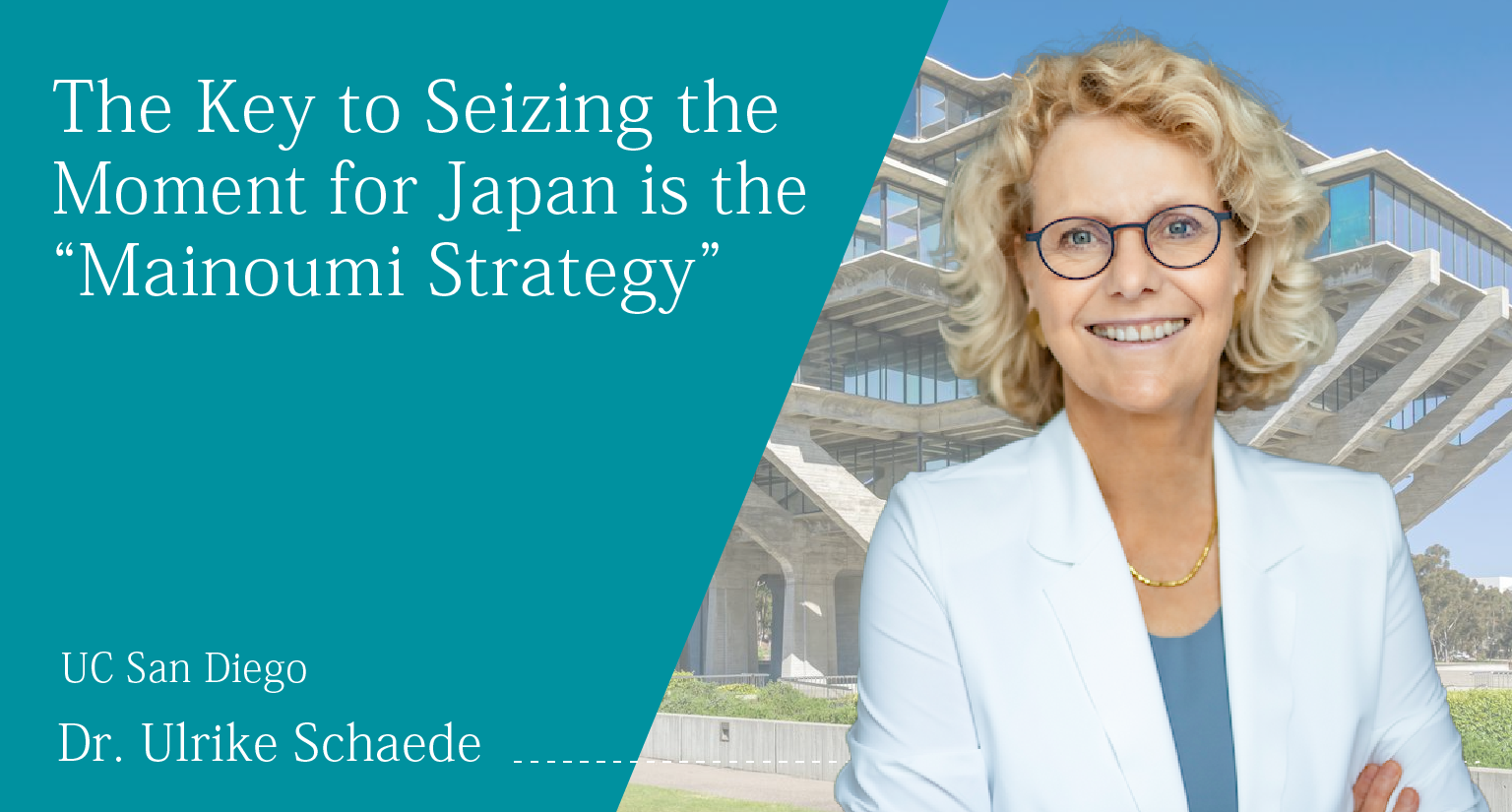“Gender equality” is one of SDG’s goals and is a subject that has been attracting global attention. However, according to the “Global Gender Gap Index,” Japan has one of the lowest levels of gender equality in the world and has achieved little improvement in the significant disparity that exists between men and women in the business world. Therefore, as we look ahead to our society in the future, companies will be called upon to make serious efforts to address this problem of gender disparity.
In this regard, we spoke with Dr. Brigitte Steger, who researches gender in Japan at the University of Cambridge, about the problem of the gender gap in Japan and strategies for solving it.

Dr. Brigitte Steger
Professor at the University of Cambridge
Dr. Brigitte Steger is a scholar of Japanese Studies and Cultural Anthropology. She serves as a professor at the University of Cambridge, where she teaches about Japanese society. She is Austrian and earned her Mag. Phil. and Dr. Phil. degrees in Japanese Studies (with minors in Sociology and Political Science) from the University of Vienna.
She is also Chair of the Cambridge University Japan Gender Research Group and has edited works such as Manga Girl Seeks Herbivore Boy (2013), Cool Japanese Men (2017), and Beyond Kawaii (2020).

The problematic areas in Japan’s gender gap are “economic participation” and “political empowerment.”
Sato:
Japan always ranks very low in the “Gender Gap Index” that is reported annually. Despite calls for women’s social advancement and participation, why is it that the gender gap between men and women seems to remain largely unchanged, even on a global scale?
Dr. Steger:
According to the “Global Gender Gap Report” issued by the World Economic Forum (WEF) in June 2023, Japan ranked 125th out of 146 countries in terms of the Gender Gap Index. This was a drop of 9 places from 116th place in 2022, making it the lowest rank ever recorded.
However, the “Global Gender Gap Report” comprises four main categories:
- economic participation and opportunity
- educational attainment
- health and survival
- political empowerment
In the case of Japan, there is not much gender disparity in terms of “health” and “education.” However, there is a noticeable gap in “economics” and “politics,” with “politics” ranking particularly low at 138th globally. This means that while there may be equality in terms of education and health, it’s hard to deny the presence of a gap when it comes to economics and politics.
Sato:
When we talk about the gender gap in economics and politics, what are some specific cases?
Dr. Steger:
The gender gap in Japan in regard to the “politics” category in the Gender Gap Index is well known, but in terms of “economic participation,” one significant factor that contributes to the gap is the low rate of female managerial appointments. One of the issues that is easiest to understand in this regard is resigning from and re-entering the workforce due to childbirth and childcare. This return to work after maternity or childcare leave is one area where Japan and Europe display the most significant disparity. While the gender gap in employment when seeking work in one’s twenties has somewhat diminished, it becomes noticeably more difficult for women to find suitable employment once they reach their thirties. While part-time and temporary positions, small companies, and self-employment may offer women some opportunities, securing a job at a large corporation is challenging, and the situation is not very flexible when it comes to career development. This is mainly because Japanese organizations usually evaluate individuals based on factors such as time commitment, loyalty, and dedication rather than whether they can do the job.
Even for those women who have retained their jobs in large corporations, taking a year off for childcare, illness, or caring for elderly parents, or regularly leaving work at the end of the official working day and not being available at the last minute for overtime can result in them being overlooked for positions of significant responsibility and ultimately having to give up on their careers. In reality, few women can dedicate 100% of their time to their jobs once they have children.
Sato:
Yes, it’s certainly not surprising given the current environment in Japan where women are unable to devote as many hours as men to their work due to childcare and such like that the proportion of female managers is so low.
Creating an environment where role models can emerge will lead to an increase in the number of women who follow in their footsteps.
Dr. Steger:
To change this situation, we first need to see the emergence of role models in Japan. Even in Japan, female doctors and female CEOs are portrayed in TV dramas, but such role models are rarely encountered in everyday life. That’s because the notion of “femininity” as recognized in Japan does not accord with the characteristics required for success in business. Being competitive and assertive in the workplace and being a tough negotiator are viewed as being unfeminine. In other words, women face the dilemma that in order to succeed in business they risk being censured as women.
If there were already role models, it would be like, “Ms. A is successful in business but also maintains her feminine charm. Young women should aspire to be like her.” However, due to the scarcity of such role models in Japan, many women try to fit into the binary framework of “femininity” and “masculinity” and give up somewhere along the line, thinking they cannot succeed. If there are no female department heads in the company where you work, it’s quite natural to feel that it’s not possible to gain promotion as a woman. In the current situation in Japan, although in principle there is gender equality, there are still psychological barriers, and without pioneers, women cannot establish networks among themselves. Therefore, it’s crucial to have older, more experienced women who can get alongside those starting out and provide advice on how to best deal with difficult situations and how to think strategically about one’s career. This would also help reduce problems like sexual harassment.
Sato:
What is needed to create a society where role models can emerge and people can aspire to be like them?
Dr. Steger:
I believe that flexibility on the part of companies is crucial for closing the gender gap in Japan. In the world of business, the biggest problem is that experiences and skills acquired outside of the workplace are seldom recognized in Japan.
As mentioned earlier, in Japan loyalty is often valued more than competence at work. When performance is evaluated based on loyalty rather than actual job performance, things like getting up early and working long hours until late at night and working continuously for the same organization are viewed as most important. Consequently, even if someone doesn’t bring much benefit to the company, they may well be valued more highly than a person who is better at the job or has experience of living overseas or voluntary work. Evaluating individuals based on loyalty makes it difficult to assess men and women equally. However in reality, there are very few people who can concentrate on their work for 16 hours straight anyway.
Therefore, companies should base their evaluations as much as possible on skills and performance. Performance comes in various forms. For example, it’s been shown that raising children enhances multitasking abilities and develops skills similar to those required for managerial positions. Also, maintaining good interpersonal relationships and the ability to put yourself in other people’s shoes are both qualities that are required in the workplace. Skills such as these that can be acquired outside of the company are essential within an organization, yet currently they receive little recognition in the way that employees are evaluated.
Sato:
The skills that you have mentioned such as multitasking seem particularly important for those in managerial positions. Why do you think such factors are not taken into account in evaluations?
Dr. Steger:
The problem is that many people in companies and politics have no experience outside of the workplace and they feel most confident recruiting and promoting people who are similar to themselves. For instance, when looking for a job, those who have experience of living abroad and supporting themselves with part-time and occasional work for an extended period or those who have obtained a doctoral degree are often viewed less favorably than those applying straight from university. The absence of women in senior positions means that it is highly likely that those in positions of authority have little first-hand experience of raising children, looking after elderly parents, or the self-motivation and struggle required to finish a PhD. If managers themselves have not experienced such things, they cannot understand the challenges that may arise and the competencies people develop in such circumstances, so they don’t recognize the importance of employees who engage in such activities outside of the workplace.
In post-war Japan, it was primarily women who were responsible for household chores, bringing up children, looking after parents, and community-related work. While men were seen as the breadwinners, women were not recognized as contributors to the economy and were even exempt from paying taxes if they were married. This was a long way from gender equality, but through movements like feminism, increasing attention began to be paid to improving the status of women and their potential contribution to the workforce in light of the aging population and labor shortage.
However, the fundamental structure whereby women bear the main responsibility for household chores, childcare, and care of the elderly hasn’t changed. Ideally, men should actively participate in childcare, not just to help their wives but to experience for themselves the many things they can learn through sharing such responsibilities. By doing so, they will realize that raising children requires various skills and that skills acquired in this way are valuable. In the future, it’s essential for men to actively participate in caring for children and the elderly in order to expand their understanding, and foster a more flexible mindset.
Real-life experiences are the key to achieving flexible work arrangements.
Sato:
I see. So, it’s not just about creating new systems and structures but also about men experiencing the kind of work that has traditionally been assigned to women. This can lead to the realization of more flexible working arrangements, correct?
Dr. Steger:
Exactly. If we don’t gradually expand the scope of what men understand and promote more women to managerial positions, organizations’ perspectives will remain narrow and lacking in diversity. When men adopt a female perspective, it broadens their horizons and often leads to improvements in the way things are done. In Europe, we’ve seen a gradual increase in female CEOs and department heads, whereas in Japan they’re very rare. As a result, many work-related issues remain fundamentally unresolved and are merely addressed at the surface level.
Of course, it’s not only a change in thinking that is required, as there are still significant shortcomings in terms of the system as well. In Japan it’s basically difficult for anyone – not just women – to take any form of long-term leave. This needs to be improved. Unless companies can change the way that taking leave results in career stagnation and resignation, then Japan’s position on the “Gender Gap Index” will remain low. It is important to recognize that taking time off to raise children, further one’s education, and explore other pursuits can contribute to skill development and career enhancement. To foster a more flexible environment, companies should establish a variety of leave policies.
Sato:
What types of leave policies exist overseas?
Dr. Steger:
To take one example, my home country of Austria has a sabbatical system. People who have worked continuously for 15 years can discuss with their superior what they would like to do to fulfil their own personal aspirations. They can choose to receive 80% of their normal pay for a 5-year period and take one year of this time off (while still receiving 80% pay); or they can work for 5 years at 90% pay and take half a year off to do whatever they want. Rather than being viewed negatively as a “short-timer,” this system gives people who have maybe always wanted to travel but never had the time the opportunity to do just that without having to hand in their notice. There is also the option to take “study leave” and attend courses, during which time employees are paid a salary of about 55%, which is financed by unemployment insurance. Such policies are very popular in Austria, as they allow individuals to refresh themselves during these periods of leave, enjoy a social life and acquire various skills that they wouldn’t gain from just working.
Japan, by contrast, lacks such leave policies, which leads to many people either experiencing burnout or having to quit their job to pursue their own interests or what they want to do. In addition, there are cases where women who were working as teachers have left their jobs to bring up children but then find they are unable to return to teaching at the same level after their children have grown up. Japan needs to establish flexible policies to accommodate the working styles of many different people.
And even in the case of parental leave or care, it wouldn’t have a negative impact on the career if companies made it possible for everyone with young children or with elderly parents to take it. However, if only a few people take leave and their workmates have to shoulder the additional burden, it is bound to cause resentment and dissatisfaction. But if you establish parental leave or care as a policy that is available to everyone, it will increase people’s understanding of other people’s situations and everyone will be able to make effective use of the system.
Sato:
Thank you for sharing your valuable insights. Could you please share a message with our readers before we conclude?
Dr. Steger:
Gender equality does not mean creating a society that is detrimental to men. When power is decentralized within a company, it may reduce the power held by men, but it will undoubtedly lead to a more humane workplace. However, women also need role models as well as encouragement and support. I feel many Japanese women often hesitate to say “I can,” even when they possess the necessary skills. Taking the first step is always daunting, and personally, I doubt I would have had the courage or know-how to apply for my current position at the University of Cambridge if I hadn’t had the support of a mentoring group at the University of Vienna and a role model among my peers who became a professor in America.
The number of female managers is steadily increasing, and there are some sectors like publishing and cosmetics companies that have a strong female presence. While personality traits may well play a role, please consider how you can advance your career, including factors like salary and leave, and think about what steps you can take to achieve success.
( Interviewer: Naoto Sato )









